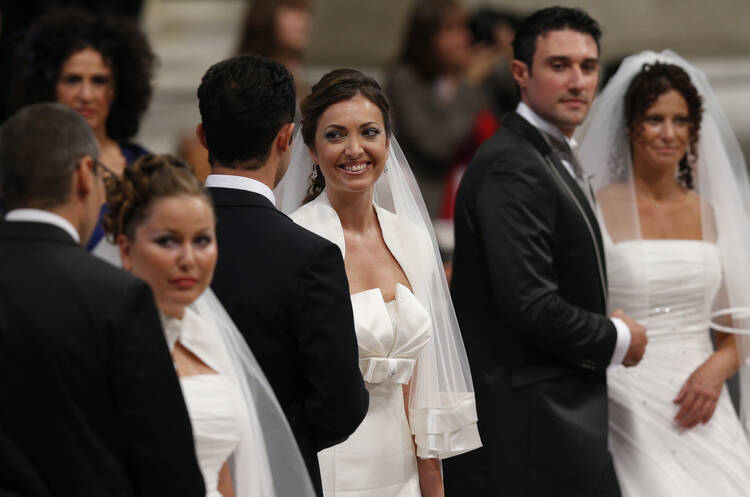Pope Francis issued two Apostolic Letters motu proprio on Tuesday, by which he introduced reforms to the legal structures of the Church, which deal with questions of marital nullity. One of the Letters motu proprio, known by its Latin title, Mitis Iudex Dominus Iesus – or “The Lord Jesus, Clement Judge” – reforms the Code of Canon Law (CIC) governing the Latin Church, while the other, Mitis et misericors Iesus or “Clement and merciful Jesus” – reforms the Code of Canon Law for Oriental Churches (CCEO). According to the prefatory remarks attached to both Letters, the reforms are the result of an expert group appointed to study the current state of law and practice in the Church as far as marriage law is concerned.
The Holy Father goes on in the preface to explain that the reforms are guided by seven specific criteria, ample excerpts of which Vatican Radio offers below in its own unofficial English translation: 1. That there be only one sentence in favor of executive nullity – It appeared opportune, in the first place, that there no longer be required a twofold decision in favor of marital nullity, in order that the parties be admitted to new canonically valid marriages: the moral certainty reached by the first judge according to law should be sufficient.
2. A single judge under the responsibility of the Bishop – The constitution of a single judge in the first instance, who shall always be a cleric, is placed under the responsibility of the Bishop, who, in the pastoral exercise of his own proper judicial power shall guarantee that no laxity be indulged in this matter.
3. The Bishop is judge – In order that the teaching of the II Vatican Council be finally translated into practice in an area of great importance, the decision was made to make evident the fact that the Bishop is, in his Church – of which he is constituted pastor and head – is by that same constitution judge among the faithful entrusted to him. It is desired that, in Dioceses both great and small, the Bishop himself should offer a sign of the conversion of ecclesiastical structures, and not leave the judicial function completely delegated to the offices of the diocesan curia, as far as matters pertaining to marriage are concerned.
4. Increased brevity in the legal process – In fact, beyond making the marriage annulment process more agile, a briefer form of trying nullity cases has been designed – in addition to the documentary process already approved and in use – which is to be applied in cases in which the accusation of marital nullity is supported by particularly evident arguments. In any case, the extent to which an abbreviated process of judgment might put the principle of the indissolubility of marriage at risk, did not escape me [writes Pope Francis – ed.]: thus, I have desired that, in such cases the Bishop himself shall be constituted judge, who, by force of his pastoral office is with Peter the greatest guarantor of Catholic unity in faith and in discipline.
5. Appeal to the Metropolitan See – It is fitting that the appeal to the Metropolitan See be re-introduced, since that office of headship of an Ecclesiastical province, stably in place through the centuries, is a distinctive sign of the synodality of the Church.
6. The proper role of the Bishops’ Conferences – The Bishops’ Conferences, which must be driven above all by the anxious apostolic desire to reach the far-off faithful, should formally recognize the duty to share the aforesaid conversion, and respect absolutely the right of the Bishops to organize judicial power each within his own particular Church. The re-establishment of vicinity between the judge and the faithful, in fact, shall not be successful if the stimulus does not come from the Conferences to the single Bishops, along with the necessary assistance, to put into practice the reform of the marital nullity process.
7. Appeal to the Apostolic See – It is fitting that the appeal to the ordinary Tribunal of the Apostolic See, i.e. the Roman Rota, be maintained: this, in respect of a most ancient juridical principle, so that the bond between the See of Peter and the particular Churches be reinforced – having care, in any case, in the discipline of the use of said appeal, to contain any and all abuse of right, in order that the salvation of souls be given no cause for harm.
Indeed, the prefatory remarks make clear from the very start, that the single most important principle guiding the Holy Father’s action and the work of reform undertaken, is that of salus animarum – the salvation of souls – which is the suprema Ecclesiae lex – the supreme law of the Church.








